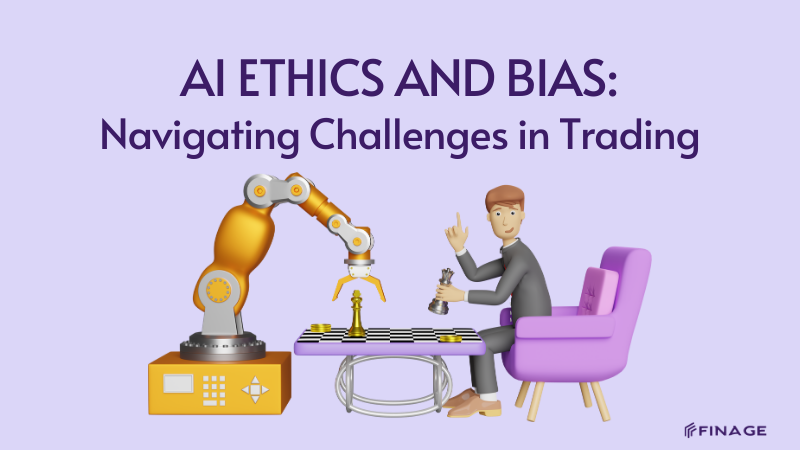
AI Ethics and Bias: Navigating Challenges in Trading
Artificial intelligence has proven itself useful across various fields and stock trading. The general finance world has seen its use featured quite prominently in various platforms and apps. As useful as this innovative tech is, it does present a lot of issues that particularly get into the realm of ethics and bias, especially in the trading space. The bias is not just a theoretical concern for the future within the domain of AI and machine learning in trading. It's a real and present issue that affects the development of an area, which means that finding ways to deal with it starts with particular knowledge.
The major issues that come with AI in the respective fields are important to discuss and check in detail. So accompanying this, let’s look at the measures one can use to navigate through it all, which is only reasonable, given the build-up.
Contents:
- The lingering issues
- Transparency, accountability, and privacy issues
- Market manipulation
- Addressing challenges
- Secure trading practices
- Final thoughts
The lingering issues
While sources regarding its actual size differ, the consensus is that the AI space is well projected to be worth around $184bn in 2024. The fact that it's used or will be used soon in everything from our phone assistants to the aforementioned trading/financial apps, these numbers have credence.
The tech's place in the latter fields is especially notable because it is useful in numerous ways including the following:
- It eliminates the possibility of human error, especially as a result of emotion
- It allows for 24-hour capabilities
- It increases workflow and makes it more efficient
- AI can tirelessly analyze data and execute actions
- It allows for better accuracy
With better accuracy, especially in trade, you can find opportunities the human eye can miss. Despite the above, AI has a few major issues, and one of these is bias.
Transparency, accountability, and privacy issues
The bias in trading refers to systems reflecting biased results based on the data entered by humans, society/communities and history. One of how AI is used in trading is backtesting, which takes historical data and uses it to see if a strategy is viable. If the information entered is a disparate sample size or is tailored towards only the best results, and ignores the rest, results are going to be skewed, which puts traders at a disadvantage.
Then are the ethical concerns that AI in the trading space contains. One such ethical concern is transparency, which AI doesn't seem to have on the level of humans because they operate under a level of opacity that hides their processes.
Market manipulation
As a result, there may be a lack of accountability, which is helpful for the market both morally, and legally. This, of course, isn't where the ethical issues end, as below are two others of note:
- AI could also present some market manipulation issues, especially because it's able to process so much data at once
- Privacy and security, especially if the AI strategies are highly dependent on personal data, which can be stolen by malicious actors
- AI can manipulate or generate data in ways that might not reflect reality
- The complexity of AI algorithms often results in a lack of interpretability, making it challenging for traders to understand how decisions are made and identify potential biases
Addressing challenges
Having gone through the above problems, let's take a look at how they can be mitigated. Let's begin with bias, which as we've covered, can come from many sources such as people, and data.
The best way to ensure the AI isn't biased is to ensure that the data fed into it for backtesting is free from as much bias as possible, while also being inclusive. This is to avoid potential disparities between those who have the tech, and thus the advantage, and those without such resources. It, in reality, can bring good profit and improve or solve many global challenges.
As for the numerous ethical issues, they too can be handled in several ways, one of which is regulations. AI should be regulated, with tools that are deemed as ethical promoting fairness, transparency, and accountability on the part of developers and traders.
Secure trading practices
For this to be successful, all parties have to come to a consensus as to what is ethical, and in the process, create guidelines, and deployment strategies that help the market. In doing so, staying ahead of crafty bad actors and manipulators is a lot easier.
The final issue that will be addressed is cybersecurity, and data privacy, which can be mitigated through the use of - once again, regulations. If regulatory bodies can come in and form more collaborations with both lawmakers, as well as cybersecurity buffs, clear guidelines can be set, while reinforcing defenses.
Final thoughts
When you're in the financial world, using AI as part of your trading strategy or finance app sounds like a great idea, and for the reasons listed above, it can be. However, a few pitfalls do accompany this, coming I'm the form of ethical issues as well as the tech's bias. The above shows that while these issues are prominent, and can be difficult to curb, it is possible through measures like acquiring quality data and employing regulations among many.
That said, it isn't surprising to find that AI has such challenges. Considering that traders can seek profit without ethics sans AI, perhaps the change may need to start with them.
You can get your Real-Time and Historical Market Data with a free API key.
Build with us today!


